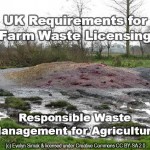So-called; “One Stop Shop Environmental Permits” is what the EP regulations promised when introduced by Defra UK. The UK environmental regulations have been simplified for the first time in years, in a move which has been largely unreported in the technical press.
In a move welcomed by the waste management industry, the Environmental Permitting (England and Wales) Regulations (EP) were brought into effect on the 6 April 2008, and have been repeatedly updated with new guidance several times since (e.g. Autumn 2014). At their heart these regulations continue to implement pre-existing statutes but are aimed at delivering a risk-based approach to streamline and simplify waste permitting regulation, thereby reducing the bureaucratic requirements for the lower risk sites.
Whereas, both waste activities and industrial activities, were previously regulated under separate Waste Management Licensing (WML), and Integrated Pollution Prevention and Control (IPPC) regulations, both will from now on be regulated together under a single new regime.
In addition, standard permits have been introduced so that small and less complex permits can be issued for the most common waste management facility types.
If this is successful, it is thought that Defra has plans that this will be extended to other environmental regulations which will be brought under the EP umbrella, over a period of time.
The greatest benefits are being enjoyed by process operators, especially in the waste sector, where multiple authorisations and the need for very expensive to set-up “bespoke” permits for even the simplest installation, were previously an unwelcome feature of the WML and IPPC regimes.
At the core of the EP, simplification philosophy is the publication of a series of standard permits. However, although originally available for waste management facilities, this is being broadened out as new guidelines are published. Examples of these types of “standard” installations include waste transfer stations, household and civic waste sites, and Materials Recycling Facilities (MRFs).
The full panoply of requirements still applies to large and high-risk installations, but there is now an option of applying for a standard permit, which is now available for low to medium risk facilities. This is subject to capacity limits on standard permits which will restrict their use to most sites to treating 75,000 tonnes of waste per year (but this could be as low as 5,000 tonnes per year for outdoor waste transfer stations).
The option to apply for a bespoke permit for all sites will remain open to applicants who wish to maximise operational flexibility, although this will also revert a project to the much-criticised old system which was often slated for its high application costs, and potential for delays to project programmes.
For those familiar with the Waste Management Licensing Regime, the EP regime brought requirements similar to those seen in PPC permits, including tightened staff competency requirements and formalised Environmental Management Systems (EMS).
Multiple Sites With Environmental Permits (EPs)?
 For operations eligible for standard environmental permits, the EP regulations will bring a potential opportunity for the site operator to save money and streamline permit administration. This comes about due to the fact that the new regulations (Reg. 17(d)) allow an operator to hold one standard permit that can apply to more than one site in different locations.
For operations eligible for standard environmental permits, the EP regulations will bring a potential opportunity for the site operator to save money and streamline permit administration. This comes about due to the fact that the new regulations (Reg. 17(d)) allow an operator to hold one standard permit that can apply to more than one site in different locations.
Operating a number of sites under a single permit could be a lot cheaper when making the application and in future subsistence fees, although the details of this are not known at the time of writing.
The Future for Environmental Permitting (EP)?
There is now a second phase of the EP Programme (EPP2) planned by Defra during it plans to extend the common permitting approach to a number of other environmental permitting regimes. Whoever, this will take time to implement and was thought at the time likely to take two or more years to implement, after implementation in Summer 2008.
Activities which may in future be suitable for EPs to include water discharge consenting, groundwater abstraction authorisation, river water abstraction, radioactive substances regulation and licensing of some waste carriers and brokers.
Let Us Help you with your Waste Facility Permit Application?
When Does a Landfill Stop Being a Landfill – Final Storage Quality
When Does an Old Landfill Cease to be a Landfill? In other words, when can an old landfill be left as it is, not monitored and used for any purpose it's owner wants to use it for, because it no longer contains anything which harm the environment? [box size=”large” style=”rounded” border=”full”]There is an easy and […]
UK Requirements for Farm Waste Licensing
EU Waste Framework Directive: The new UK requirements for farm waste licensing Farm (agricultural) waste disposal will as from this year (July 2006) regulated by the Environment Agency under the same regulations as municipal, commercial and industrial waste. Until the extended implementation date this summer (2006) agricultural businesses have been exempted from the Waste Management […]







